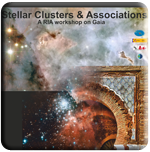Stellar physics with the ALHAMBRA photometric system
Aparicio Villegas, T.; Alfaro, E. J.; Cabrera-Caño, J.; Moles, M.; Benítez, N.; Perea, J.; del Olmo, A.; Fernández-Soto, A.; Cristóbal-Hornillos, D.; Aguerri, J. A. L.; Broadhurst, T.; Castander, F. J.; Cepa, J.; Cervio, M.; González Delgado, R. M.; Infante, L.; Márquez, I.; Masegosa, J.; Martínez, V. J.; Prada, F.; Quintana, J. M.; Sánchez, S. F.
Journal of Physics: Conference Series, Volume 328, Issue 1, pp. 012004 (2011).
12/2011
ABSTRACT
The ALHAMBRA photometric system was specifically designed to perform a tomography of the Universe in some selected areas. Although mainly designed for extragalactic purposes, its 20 contiguous, equal-width, medium-band photometric system in the optical wavelength range, shows a great capacity for stellar classification. In this contribution we propose a methodology for stellar classification and physical parameter estimation (Teff, log g, [Fe/H], and color excess E(B - V)) based on 18 independent reddening-free Q-values from the ALHAMBRA photometry. Based on the theoretical Spectral library BaSeL 2.2, and applied to 288 stars from the Next Generation spectral Library (NGSL), we discuss the reliability of the method and its dependence on the extinction law used.


